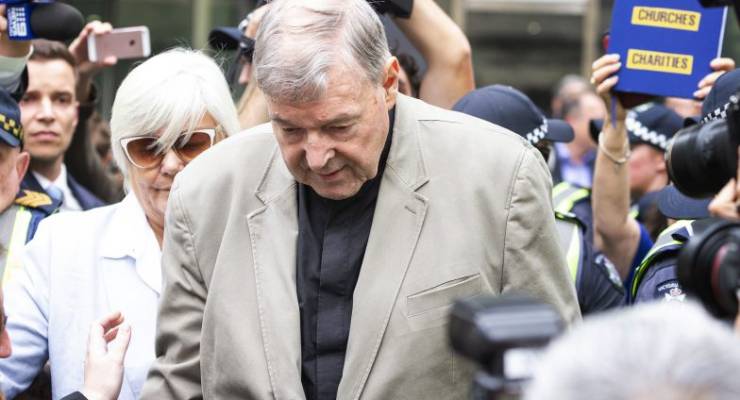
The George Pell story continues. This morning the High Court announced that it will hear Pell’s appeal from his conviction. That will happen some time in the first half of next year, most likely. It may or may not be the final chapter, depending on the result.
To recap: Pell was found guilty by a jury in the Supreme Court of Victoria of committing a number of sexual assault offences against minors in 1996 or 1997. The allegation was that he had cornered two choirboys in the cathedral after mass, then committed a rape and four indecent acts on them. He was convicted on the testimony of one of his victims.
Pell’s appeal to the Court of Appeal rested on a number of grounds, the main one being that the jury’s verdict was unsafe because, for 13 different reasons, it was physically impossible for him to have committed the crimes. By a two-to-one majority, the court rejected his appeal.
The final appeal is to the High Court of Australia. Appeals there do not lie “as of right”. You apply for special leave, and the court decides whether to grant it. If it does, you get to run your appeal before the full court of up to seven judges.
The High Court grants special leave in about 10% of cases (14% for criminal appeals). All applications used to be made orally and determined by two judges in court, but most are now dealt with “on the papers”. That was what happened with Pell’s application.
Technically, special leave hasn’t been granted. Justices Gordon and Edelman have referred the special leave application to the full court “for argument as on an appeal”. Of course, in practical terms, there’s no difference, although theoretically the full court could still decide not to grant leave once it’s heard the application.
This outcome doesn’t tell us much about the prospects of Pell’s actual appeal. The High Court is unpredictable in its decisions, both generally and in criminal cases. That’s unsurprising, because it is the court that decides what the law is. Second-guessing it is a pointless exercise.
The appeal is going to be quite different from that run in the Court of Appeal. It takes two parallel tracks: first, Pell’s new team, led by Bret Walker SC, argues the Court of Appeal erred by effectively reversing the onus of proof. Instead of the Crown having to prove guilt beyond reasonable doubt, they say, Pell was forced to prove his impossibility defence.
Secondly, Pell’s team will argue the majority in the Court of Appeal was wrong in finding that the jury’s guilty verdict was not unreasonable, on the basis that, as a matter of inescapable logic, reasonable doubt clearly existed all along.
These arguments expose, from a legalistic angle, the issue at the heart of Pell’s trial from the beginning. Indeed, it is the intractable problem that sexual assault cases so often raise: how to deal with a category of crime that is committed in the dark, without witnesses.
Pell’s jury believed his accuser’s uncorroborated testimony, and disbelieved Pell’s denials. It wasn’t moved by the witnesses called by Pell to explain how he could not have done the crime, nor those who said he would not have.
On appeal, two judges, having watched the video of the victim’s testimony, concluded that his account was credible and compelling and that it was open to the jury to have believed him. It did not think that the impossibility argument stacked up sufficiently to override the jury’s assessment.
The minority judge went the other way, finding that the jury’s verdict was unreasonable and that reasonable doubt was present.
For the High Court, there are two questions. It may consider that there is a question of legal significance to be dealt with, in relation to the way that an appeal court is required to handle appeals from jury verdicts. This will revolve around the test that appeal judges should apply to themselves when considering the safety of a verdict. There will be a legal debate over impossibility and how it relates to the burden of proof.
The second question is whether an injustice has been done. The High Court has itself said repeatedly that, putting aside all technical legal grounds, an appeal court must quash a criminal conviction if it concludes that a miscarriage of justice has occurred. If the judges have a serious doubt, then logically the jurors should have had one, too.
The High Court’s sensitivity to criminal miscarriages is unsurprising, given that it knocked back Lindy Chamberlain’s appeal from her conviction which, it turned out, was an absolute travesty. There is always a chance for a criminal appellant that the court will be sufficiently disquieted to quash their conviction.
If that happens, Pell may be sent back for a fresh trial on the same charges. Alternatively, the court can say that’s enough. He’s had two trials already (the first resulted in a hung jury) and served material time in prison; he’s also about to turn 80. There’s a strong likelihood that he will be made a free man if his appeal succeeds.
The only result that is not possible is a declaration of innocence. That’s not something the criminal justice system does, at any level. It determines guilt, or non-guilt.
Now, again, we wait.








Crikey encourages robust conversations on our website. However, we’re a small team, so sometimes we have to reluctantly turn comments off due to legal risk. Thanks for your understanding and in the meantime, have a read of our moderation guidelines.